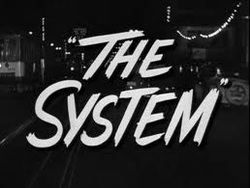
In working with both clients and also students over the years, I am constantly reminded of one singular obstacle everybody seemingly faces at some point in their lives - "the system". I remember a particularly hilarious episode of "All in the Family" from the 1970's in which Archie confronts the system when his homeowner's insurance is suddenly and mysteriously cancelled. His comic-induced frustration and sense of powerlessness was telling and an eerie foreshadow of things to come as bureaucracies and faceless corporations would gain ever more power and control in our society. Whether it is healthcare systems, financial aid systems, criminal justice systems, or any number of other systems, people can't help but to feel a numbing sense of hopelessness and anger when caught within these dehumanizing clutches.
Max Weber, a well-known early sociologist, warned about this coming doom as societies convulsed under the pressure of the Industrial Revolution. He spoke of the "iron cage" that stifled humanity's inherent glory as systems took hold. He was right. I often feel sadly inadequate when trying to help students and clients sort through the maze of rules and regulations they often confront. Their glazed-over expressions conveying a sense of indentured servitude are heartbreaking. Just as Archie felt a loss of control over his own destiny at having his insurance inexplicably cancelled, these folks also sense a loss of autonomy at not having a say in how they are treated.
So, it becomes ever more important that we affirm each other as individuals and as human beings worthy of respect and dignity. Regardless of past behaviors and choices, we all deserve the right to be treated with courtesy, compassion and love. We can never dissolve the systems that we've created, but we can resolve to improve their efficacy so that they do not necessarily dehumanize us. Here is yet one more example in which we share a common bond. Who among us has not been angered by some inane rule or regulation that seems to make no sense? That stranger sitting next to you has, and so has the person standing in line behind you. Acknowledge them with a knowing smile and nod. After all, we really are all in this together - for better for worse.
Be kind to yourself and to others.
© Copyright 2013 Douglas Layer, LMHC
Max Weber, a well-known early sociologist, warned about this coming doom as societies convulsed under the pressure of the Industrial Revolution. He spoke of the "iron cage" that stifled humanity's inherent glory as systems took hold. He was right. I often feel sadly inadequate when trying to help students and clients sort through the maze of rules and regulations they often confront. Their glazed-over expressions conveying a sense of indentured servitude are heartbreaking. Just as Archie felt a loss of control over his own destiny at having his insurance inexplicably cancelled, these folks also sense a loss of autonomy at not having a say in how they are treated.
So, it becomes ever more important that we affirm each other as individuals and as human beings worthy of respect and dignity. Regardless of past behaviors and choices, we all deserve the right to be treated with courtesy, compassion and love. We can never dissolve the systems that we've created, but we can resolve to improve their efficacy so that they do not necessarily dehumanize us. Here is yet one more example in which we share a common bond. Who among us has not been angered by some inane rule or regulation that seems to make no sense? That stranger sitting next to you has, and so has the person standing in line behind you. Acknowledge them with a knowing smile and nod. After all, we really are all in this together - for better for worse.
Be kind to yourself and to others.
© Copyright 2013 Douglas Layer, LMHC
 RSS Feed
RSS Feed